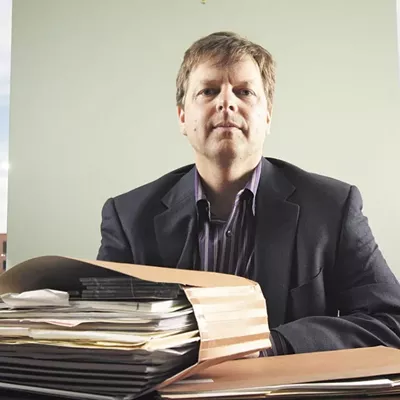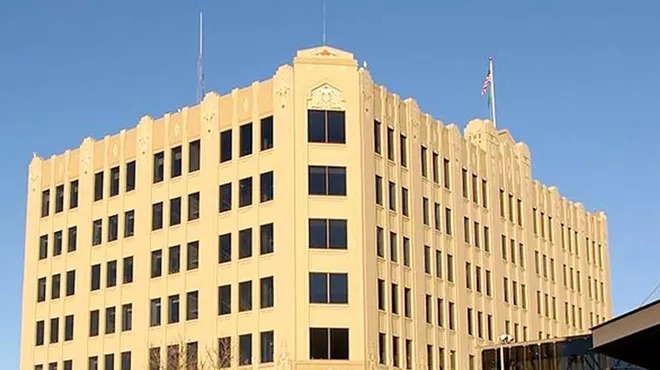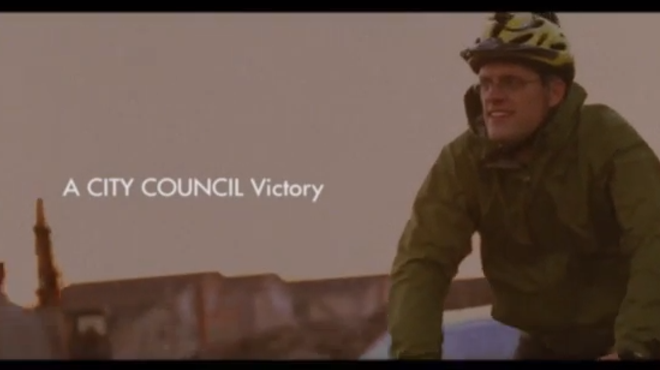Monday, February 8, 2016
All seven final council seat candidates support "going it alone" on the Central City Line

Breean Beggs, like every other finalist to replace City Councilmember Jon Snyder, supports the city funding the Central City Line without the rest of the county if it has to.
Last week's City Council interviews with candidates to replace outgoing District 2 councilman Jon Snyder give insight not only into the candidates, but into the direction of the current council.
Many of the candidates listed different top priorities for District 2, with some naming public safety and others citing criminal justice reform, revitalizing neighborhoods, and even fixing sidewalks. But on one potentially controversial question all seven of the final candidates came down on the same side: Should the city be willing to pursue funding the Central City Line on its own if necessary?
The Central City Line, a
"Losing by 572 votes was not a referendum on STA" or specific projects in its plan, STA CEO E. Susan Meyer told the Inlander last year. "On the ballot measure, there wasn’t a question about voting for the Central City Line. It was about maintaining or expanding service." In fact, only 5 percent of the no-votes that STA surveyed cited the Central City Line as the reason they opposed the bill.
Due to a variety of factors, STA has since determined it could actually fund their Moving Forward plan — including the Central City Line — with less of a tax increase. But that doesn't mean the STA Board has decided to risk asking voters to approve a measure very similar to the one they just narrowly rejected. In particular, members of the deeply conservative, tax-averse Spokane Valley Council are skeptical of paying for a bus route that mostly affects citizens of Spokane.
But Spokane voters generally supported the STA measure. And so did all seven of the final council candidates. Should the city be willing to "go it alone" to fund the Central City Line? You bet, said every candidate.
1. John Waite, perennial council candidates and owner of
“My thought is that should actually be a free route," Waite says. "Like the Seattle city lines used to be back in the day… An economic benefit [of that] is you’ve got people going through downtown, going through our business corridor, shopping, getting coffee, getting lunch.”
2. “I do support that," said Todd Beyreuther, an assistant researcher professor of architecture at WSU, regarding the city pursuing the Central City Line alone if it must. "I strongly support that." He wants the city to go into granular detail to make sure that their transit plans — down to the bus stop level — fits precisely with the overall planning strategy.
3. “We talk about being the 'city of choice,'” said Breean Beggs, local attorney and former Center for Justice "chief catalyst." "We want to be the ‘Transit Authority of Choice.’ It should not be like a second-class situation, in that only the people who can’t afford cars are in the transit [system] …. I think good transit will eventually grow our economy, and it will equalize some of the income inequality issues that are out there, giving good access to good jobs, no matter where you live.”
The success of the Central City Line, he said, would actually help educate more people about transit, boosting support for it. “We have to get to that tipping point where transit makes sense to a lot of people," Beggs says. "
4. "“Yes. Yes. Absolutely," said Patricia Hansen, a Cliff-Cannon neighborhood activist, when asked the Central City Line question. "No explanation needed. Yes.” She looks to California for inspiration. “I’d love to have something like Portland has and the BART system in central California,” she said.
5. Asher Ernst, a plan commission member and local pastor, was perhaps the most skeptical about "going it alone."
"I think if we have to, we need to. But honestly, it sounded, too, like STA thinks at this point we can go from a .3 tax increase down to a .2." Ernst says. "It sounds like voters may approve on that basis of a .2 cent increase. If we can do that, I think if the polling can show that, I think it would make more sense to us to do something county-wide, so we can reap the benefits of 400,000 people paying into it, rather than 200,000."
“I have some reservations about it, only in as much as we’re looking at using technology that is currently not available in the United States, as far as I understand," Ernst says. "As far as using a wireless bus that is also electronic. I look at the Central City Line as a starter line. I look at the Central City Line and say the next priority is something from the hospitals up through Division.”
Mostly, he says, the transit conversations should be embedded within city planning.
6. Phillip Tyler, vice president of the NAACP, cites his personal experience for his support for a strong transit system. "As a single parent, I recall taking my child in a carrier with my daughter in hand and getting to our bus stop," Tyler says. "And I knew the impact on when they decreased the bus route — this is what has happened currently — the impact of me walking six blocks versus three blocks to do that."
He also suggests it would help decrease carbon emissions and boost the economy, and is a fan of the Central City Line. "I'm all for it," Tyler says. "I know in the media, there's been some talk about putting [the ballot measure funding] out to our constituents again. And if we have to 'go it alone' — as I've read in the paper — I'd be more than happy to go along with that as well."
7. Blaine Stum, chair of the Spokane Human Rights Commission, said he’s personally experienced massive panic attacks when driving, and STA has helped him find transportation amid those environments. “My view of public transportation is it is absolutely critical to the health and well-being of our community. It is one of those things where we have to have a robust system to be able to compete,” said Stum. “Cities are constantly relying on public transit to draw new talent, to keep people in place, and to build a more robust economy.”
In particular, transit is vital for low-income, elderly and disabled residents, he said. "I see the Central City Line as the key to all of it," Stum said, "It goes right through downtown. It starts in Browne's Addition, ends at the community college, it crosses a huge section of low-income neighborhoods that are very diverse and are currently underserved by transit."
Should the city "go it alone" with the Central City Line if necessary? "Absolutely," Stum said. "I would prefer — and I think most people probably would — to see the funding mechanism done [county-wide] but, understanding [going it alone] if elements within the board do not want to go along with the plan to fully fund and implement the 'Moving Forward' plan in a way that shows the desire of our citizens."


























